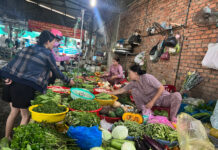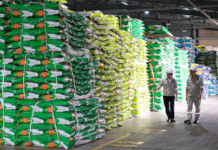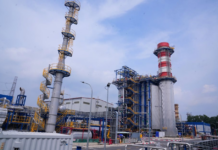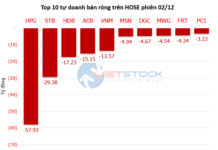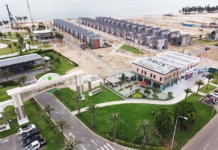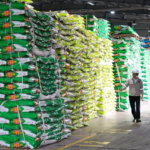Faster, Cheaper Cross-Border Payments with Blockchain Technology
Cross-border payments are a vital component of global trade and investment, with systems like SWIFT, international credit cards, cross-border digital wallets, and fintech services enabling fast and convenient transactions between individuals and businesses.
In Vietnam, tools such as international cards, domestic cards, digital wallets, and QR codes coexist, but lack effective cross-border connectivity. This hinders Vietnamese businesses from fully capitalizing on international spending, due to incompatible payment infrastructure. International tourists, particularly from China, Thailand, and South Korea, face challenges when spending at small shops, markets, and street cafes that do not accept cross-border digital payments.
“This not only creates barriers for tourists but also causes Vietnamese businesses to miss out on significant foreign spending,” said Mr. Nguyễn Hoàng Long, Deputy General Director of Napas. He emphasized that cross-border payment connectivity is essential for developing tourism, services, and digital commerce.
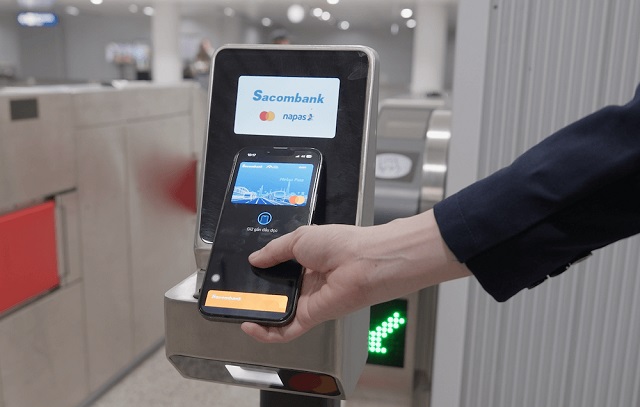
Commuters pay seamlessly on Metro Line 1 using Apple Pay. Photo: TL
|
In this context, blockchain technology and stablecoins—digital currencies pegged 1:1 to fiat money—are expected to complement traditional financial systems, enhancing payment efficiency.
Recently, the Basal Pay project, which leverages blockchain to convert cryptocurrencies to fiat and vice versa, received a controlled sandbox license from Da Nang City in late August 2025. Within Da Nang’s sandbox, users can convert crypto to fiat in seconds and spend it legally, boosting commerce and transparent revenue for the city.
According to Mr. Trần Huyền Dinh, founder of AlphaTrue Solutions and director of Basal Pay, global cross-border payments reached nearly $200 trillion in 2024 and are projected to hit $320 trillion by 2032, per the Bank for International Settlements (BIS). This highlights the massive demand for cross-border transactions, a cornerstone of international finance.
However, the SWIFT system faces limitations such as high costs and processing times of hours to days due to multiple intermediaries. While services like Western Union and MoneyGram offer faster transfers, their fees remain high and lack real-time transparency.
Blockchain and stablecoins, while not replacing traditional systems, are expected to enhance payment efficiency, user experience, security, and reduce transaction costs.
Mr. Matthew Crow, Director of Development at Tether, noted that stablecoin transactions surpassed $26 trillion in 2024, with nearly 6 billion transactions—a 57% increase from 2023, according to Coin Metrics. Notably, $2.1 trillion (8% of the total) came from real-world payments like remittances, e-commerce, freelancer payments, and business transactions.
“This shows that stablecoins are emerging as a new payment platform, complementing the slower, costlier traditional international system,” Mr. Crow said.
Tether representatives added that the shift from traditional payments to blockchain and stablecoins is particularly relevant for developing economies like Vietnam, where remittances, tourism, and digital labor are significant. Integrating stablecoins into pilot projects like Basal Pay can provide practical data to assess the feasibility of a more diverse payment infrastructure, enhancing international financial integration.
Risk Management Considerations
While blockchain and stablecoins promise faster and cheaper cross-border transactions, concerns remain about stability and legal compliance. Under current Vietnamese law, cryptocurrencies are not legal tender, and only Da Nang has piloted combining blockchain with traditional finance for crypto-fiat exchanges.

Vietnam aims to lead the region in blockchain by 2030. Photo: TL |
Mr. Nguyễn Hải Nam, Standing Member of the National Assembly’s Economic Committee, noted that new payment channels offer opportunities but also challenges. The Digital Technology Industry Law will soon provide a legal framework for innovations like blockchain. However, global views on blockchain and stablecoins vary, so Vietnam must proceed cautiously and incrementally.
To secure its sandbox license, Basal Pay complied with global regulations, particularly anti-money laundering and counter-terrorism financing (AML/CFT) rules. Its developers built a seamless architecture linking blockchain, customer identification (KYC), data sharing under the Travel Rule, and AML/CFT compliance—all while maintaining speed, stability, and reasonable costs.
“This requires not only expertise in big data, AI, and cybersecurity but also collaboration with top legal experts in digital assets, both domestically and internationally. The goal is to ensure automatic compliance with real-time accuracy and responsiveness,” Mr. Trần Huyền Dinh explained.
From a payment security perspective, Mr. Vũ Ngọc Sơn, Head of Research and International Cooperation at the National Cybersecurity Association, highlighted growing threats like phishing, malware, data breaches, and supply chain attacks in cross-border payments.
“The complexity and interconnectedness of international payment systems create vulnerabilities, exacerbated by uneven global security standards,” Mr. Sơn said. Hackers exploit high transaction volumes for money laundering or hiding traces.
To mitigate risks, organizations should promptly update software, implement multi-factor authentication (MFA), and use AI to monitor unusual transactions. Individuals should avoid suspicious emails, public Wi-Fi for financial transactions, and use virtual cards or limited digital wallets.
Legally, Vietnam should adopt robust data protection frameworks like GDPR and strengthen international cooperation in cyber intelligence sharing and cross-border emergency response mechanisms.
Vân Phong
– 07:00 15/10/2025
Nha Trang: Vietnam’s Distinctive Green Gem on the Travel Map
Nestled within Vietnam’s vibrant travel tapestry, Nha Trang stands apart with its unique shade of blue—a captivating blend of oceanic allure and rich cultural heritage. Here, the essence of the sea intertwines seamlessly with the city’s storied past, creating an unforgettable destination that beckons travelers to explore its depths.
FIATA World Congress 2025: Unlocking Global Integration for Vietnamese Businesses
Speaking to reporters, Mr. Dao Trong Khoa, Chairman of the Vietnam Logistics Business Association (VLA) and Head of the Organizing Committee for the FIATA World Congress 2025, emphasized that Vietnam has created a historic congress in the 99-year history of the Federation. This milestone firmly establishes Vietnam’s position on the global logistics map.





